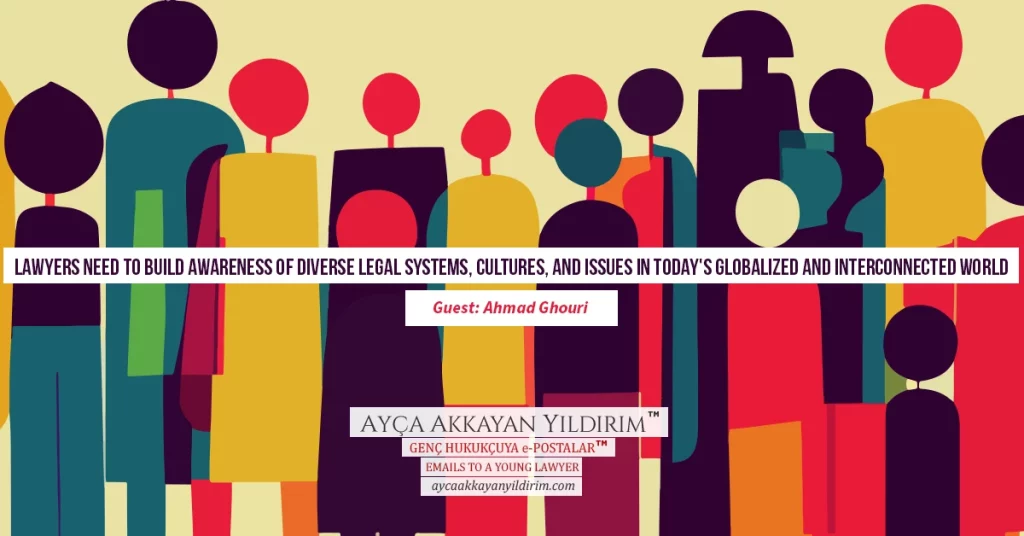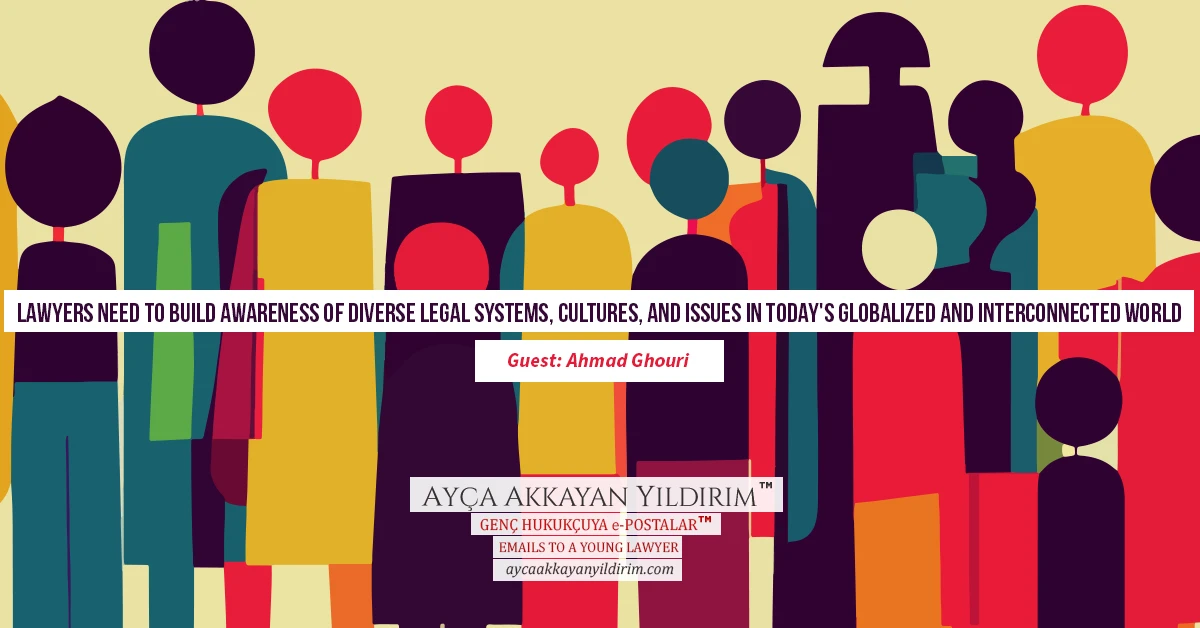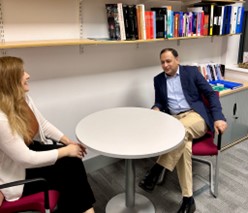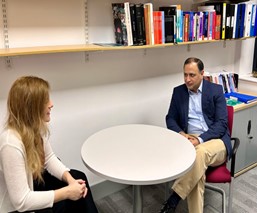Tuesday, December 26, 2023


Date : December 26, 2023
To : Young Lawyers
Re : LAWYERS NEED TO BUILD AWARENESS OF DIVERSE LEGAL SYSTEMS, CULTURES, AND ISSUES IN TODAY'S GLOBALIZED AND INTERCONNECTED WORLD
INTERNATIONAL LL.M. PROGRAMS: UNIVERSITY OF SUSSEX, SCHOOL OF LAW, POLITICS AND SOCIOLOGY, BRIGHTON, UK
I sincerely thank Dr. Ahmad Ghouri, Senior Lecturer in Commercial Law and Director of Internationalisation, for answering my questions. GHK
 |
 |
This interview was conducted in person on December 12, 2023, at the University of Sussex School of Law, Politics and Sociology.
GHK: Dr. Ghouri, could you briefly introduce yourself and describe your primary responsibilities and objectives as the Director of Internationalisation at the School of Law, Politics and Sociology?
AG: I am Ahmad Ali Ghouri, Senior Lecturer in International Commercial Law at the University of Sussex. In addition to my academic role at Sussex Law School, I am Director of Internationalisation (DoI) at the School of Law, Politics and Sociology. As DoI, I am primarily responsible for developing research and teaching partnerships with universities around the globe and overseas placements and exchanges for our students. A global outlook and international perspective of its staff and students is a central feature of the University Strategic Plan and Vision, and the DoI ensures to develop strategies and mechanisms for a coordinated approach in the achievement of these objectives.
GHK: From your perspective as the Director of Internationalisation, what are the most significant global trends currently shaping legal education?
AG: Some of the most significant global trends that are currently shaping legal education are globalization, transnationalization, and innovation. The globalization of legal education includes the adoption of processes of reform in legal education, which are informed by globalization, and what these processes mean for law and lawyers in different countries. This trend is driven by increasing demand for lawyers who can work in transnational contexts as well as by the influence of international law firms, universities, and accreditation bodies. Closely related to this is the transnationalization of legal education, which refers to the increased cross-border flows of legal academics, students, curricula, teaching methods, and research. This trend is facilitated by the development of information and communication technologies, as well as by the emergence of transnational legal issues and actors. The innovation of legal education includes the adoption of new pedagogies, technologies, and assessment methods to enhance the quality and relevance of legal education. This trend is motivated by the need to adapt to the changing legal profession and society, as well as by the competition among law schools and legal educators.
GHK: How is the University of Sussex responding to these trends?
AG: University of Sussex has made a sustained influence in the global education stage, as it is expected of a world-class university. This is not only reflected in the way Sussex has attracted international students, faculty, and researchers but is also clearly established by the many success stories of its graduates making tremendous contributions in the global marketplace. Among the other excellent schools at Sussex, the School of Law, Politics and Sociology particularly stands out with the global outreach of both its faculty and students. Undoubtedly, the School of Law, Politics and Sociology has achieved a great international reputation as it attracts students and researchers from around the globe. This certainly is due to the world-class standards set by the LPS in education, research, and scholarship.
The Sussex Law School is responding to the global trends in legal education by offering research-informed teaching and pro-bono projects and clinics for its law students and the community. Research-informed teaching at Sussex Law School takes different forms, such as using existing research to inform curriculum content, teaching students about research methods and skills, engaging students in critical discussions about research, involving students in research projects, and using teaching to advance research agendas. The pro-bono projects and clinics aim to provide practical experience, skills development, and social impact for the students and the clients. We also collaborate with local charities, organisations, solicitors, and barristers to support our clinical legal education programme. Some of the projects and clinics offered by the Sussex Law School include the Citizens Advice Project, where students work with Citizens Advice to provide legal advice on various issues such as debt, benefits, housing, and employment. We also run clinics of Employment Law, Family Law, Housing Law, Criminal Justice Law, Migration Law, and Environmental Law. Recently, we have also started some new innovative clinics on Performing Arts Law, Sports Law, and Street Law. The Street Law Clinic is quite unique in the way that students deliver interactive legal education workshops to schools and community groups on topics such as human rights, democracy, and justice.
GHK: In your role, what do you consider to be the biggest challenges facing legal education today, especially in terms of preparing students for international legal practice?
AG: That’s a very interesting and relevant question. Legal education today faces many challenges, especially in terms of preparing students for international legal practice. Some of the major challenges include adapting to the digital era, integrating interdisciplinary skills and knowledge, promoting diversity and inclusion, and addressing emerging legal issues in transnational contexts.
Technology has transformed the legal profession, creating new opportunities and challenges for legal education. Law students need to learn how to use various technologies, such as artificial intelligence, blockchain, and data analytics, to enhance their legal skills and knowledge. They also need to develop digital literacy, critical thinking, and ethical awareness in the digital environment. The legal profession is also becoming more complex and diverse, requiring law students to have a broad range of skills and knowledge from different disciplines. Law students need to learn how to collaborate with other professionals, such as business experts, social scientists, and policy makers, to solve legal problems. They also need to learn how to communicate effectively across cultures and languages. Likewise, the legal profession is becoming more globalized and multicultural, requiring law students to understand different legal systems, cultures, and values. Law students need to learn how to respect diversity and inclusion in the workplace and society. They also need to develop intercultural competence, empathy, and social justice awareness. The legal profession is facing new challenges that require innovative solutions from law students. Some of these issues include climate change, cybersecurity, human rights, immigration reform, Brexit, anti-money laundering, and e-discovery. Law students need to learn how to research these issues effectively using various sources of information. They also need to develop analytical skills, creativity, and problem-solving abilities.
These are some of the biggest challenges facing legal education today. However, they also present opportunities for law students to prepare themselves for the future of the legal profession. By embracing these challenges and developing the necessary skills and competencies, law students can become more adaptable, innovative, collaborative, respectful, and competent professionals who can contribute positively to the legal community and broader society.
GHK: How do you see the role of technology evolving in legal education and practice, and what initiatives has the University of Sussex implemented to integrate technological advancements in its curriculum?
AG: Technology is evolving rapidly in the legal field, and it has both positive and negative impacts on legal education and practice. On one hand, technology can enhance the quality, accessibility, and efficiency of legal services, as well as foster innovation and creativity. On the other hand, technology can also pose challenges such as ethical dilemmas, regulatory issues, data security, and the digital divide.
The University of Sussex is one of the leading institutions in the UK that offers a range of courses and programmes related to technology and law. One of the initiatives that Sussex Law School has implemented to integrate technological advancements in its curriculum includes the Information Technology and Intellectual Property Law LLM course, which is an innovative programme that provides students with critical and intellectual specialisation in this rapidly developing area. The course covers topics such as governance of the internet, artificial intelligence, blockchain, data protection, intellectual property rights, cybercrime, e-commerce, and e-discovery.
GHK: What specific programs or initiatives does the University of Sussex offer to prepare law students for careers in international law or cross-border legal issues?
AG: International law is a fascinating and dynamic field that offers many opportunities for lawyers who want to work on global issues and challenges. At Sussex Law School, we have modules covering various aspects of both private and public international law at undergraduate and post graduate levels, and students can choose a specialisation or area of interest within international law that suits their goals and passions. We also have the International Law LLM course, which covers the key topics and specialisations in international law, such as human rights, international criminal law, environmental law, and investment law. The course also provides opportunities for students to engage in practical skills-building through the ‘Model UN’ and ‘International Mooting’ exercises, interact with practitioners from international courts and tribunals, and apply to be involved in the new Sussex Law and Policy Centre.
We also have several elective modules in our undergraduate and postgraduate courses focused on specific areas of international law, such as international business transaction, international commercial arbitration, international investment law, international and comparative company law, international trade law, international banking law, international intellectual property law, international environmental law, international tax law, international competition law, etc. We are also planning to launch a legal clinic on international commercial dispute resolution for our LLM students.
GHK: What are the most significant challenges you face in your role, particularly in enhancing the international aspects of legal education?
AG: This is a very relevant and important topic in today’s globalised and interconnected world, where lawyers need to be aware of and responsive to the diverse legal systems, cultures, and issues that affect their practice. We have excellent resources at Sussex Law School, but law schools in many countries lack adequate resources, facilities, and faculty to provide students with a comprehensive and comparative perspective on international law and its various branches. The difficulty of integrating international law into the curriculum and assessment methods of legal education is also prevalent in some countries, especially in developing countries where legal education is often influenced by local traditions and values. A common challenge for all, however, is the need for continuous updating and adaptation of legal education to keep pace with the rapid changes and developments in international law and its impact on society. There is also the challenge of ensuring that legal education fosters critical thinking, analytical reasoning, research, and writing skills among students who will face complex and diverse legal problems in their future careers. Related to this is the challenge of providing students with practical experience and exposure to international legal issues through internships, fellowships, volunteering, moot court competitions, writing competitions, etc.
GHK: I appreciate you taking the time to answer my questions today. Lastly, based on your rich professional journey, what key piece of advice would you offer to law students aspiring to specialize in international commercial law or arbitration?
AG: International commercial law and arbitration are fascinating and lucrative fields of legal practice that require both theoretical and practical knowledge. Students who want to develop a career in this area will require deeper knowledge and understanding of the international and national legal frameworks that govern international commercial arbitration. They will also need to develop good commercial awareness and learn about different types of business forms, commercial transactions, and transnational business practices. They should also choose a law degree that offers a specialization or elective modules in international arbitration and commercial law, or pursue a postgraduate qualification in this field. Students should also seek opportunities to gain practical experience in arbitration, such as participating in moot competitions, signing up for mentorship programmes, applying for work experience programmes, or working in firms that deal with arbitration matters. Networking with arbitration practitioners, scholars, and institutions, and keeping up to date with the latest developments and trends in the field are also very important.
Finally, I would like to thank you for giving me the opportunity to express my views. I hope they will be useful for your readers.

2 Yorum
Such a nice and detailed interview.
This is an excellent information related to the legal education and working .This article can be used as guidelines for the Pakistani institution and courts.